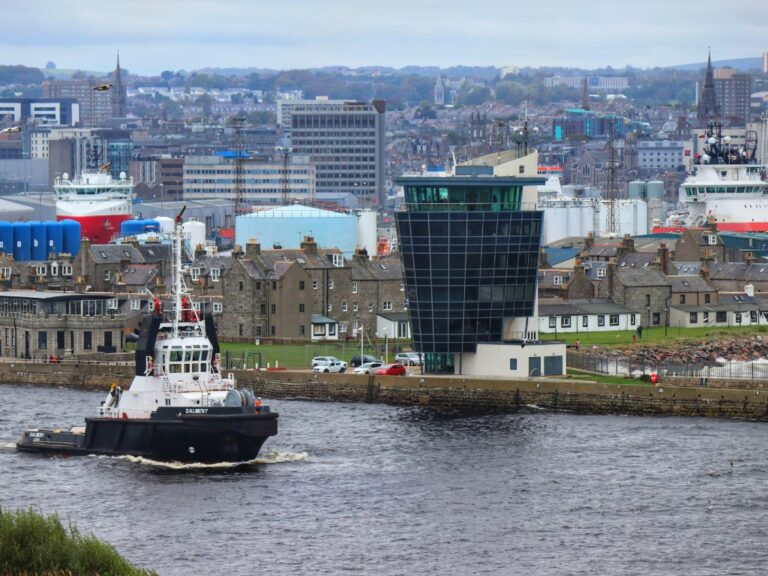Research from the Tyndall team at the University of Manchester is powering a new and cleaner way of docking ships at the Port of Aberdeen in Scotland, offering policy insight into how to roll this out quickly across the UK.
Scotland’s largest shore power project – a green shore power system in Aberdeen, Scotland – has officially launched, allowing ships to switch off their diesel fuel engines and connect to clean, low-carbon shore power when docked. This infrastructure is currently available at seven berths at its Point Law peninsula, and on Multi-Purpose Supply Vessels (MPSVs).
In earlier work with the Port of Aberdeen in 2020, the Tyndall Centre for Climate Change Research analysed the climate footprint of the port and found that vessels at berth produced 78 per cent of CO2 emissions.
This shore power project, developed with continuing input from the Tyndall Centre, will therefore significantly reduce greenhouse gas emissions and improve air quality and noise levels in a busy city-centre harbour.
It is the largest green shore power system in Scotland to date, and one of the first of its kind in the UK.
Could trail-blazing project become the norm?
The project forms part of UK Department for Transport’s Zero Emission Vessels and Infrastructure (ZEVI) competition, which offers considerable funding and collaboration between industry and academia on clean maritime technology.
Five vessels will be able to connect to the new infrastructure in the first year, with the aim of increasing to around 30 vessels by 2029. The overall ambition is to become the UK’s first net-zero port by 2040.
In their report, “Port of Aberdeen ‘Shore Power in Operation’ Project: implications for ports and policy makers”, authors Simon Bullock, Alice Larkin and Christopher Jones detail the feasibility of scaling up this project for nationwide rollout. The Aberdeen project shows that, with enough support, similar initiatives could be achieved quite quickly. Doing so to all UK ports would make an important contribution to delivering the UK’s maritime goals on air quality and climate change.
However, UK electricity is expensive compared with cheap marine fuel oil, and the review highlights the policies and incentives needed from the UK Government to accelerate shore power deployment.
Dr Simon Bullock, lead author on the article, says:
“We are proud to be involved in this trail-blazing project, which uses shore power to improve air quality for the people of Aberdeen and will help to cut greenhouse gases from the shipping sector. Critically, our research illustrates that shore power projects could become the norm with greater support from UK Government to lower electricity prices.”
Role of research in decarbonising shipping
The Port of Aberdeen project forms part of ongoing Tyndall Centre work into reducing maritime emissions in line with UK and international climate targets.
Projects like this show the real-world impact of academic research on tackling climate change, both in the shipping sector and elsewhere.
- Read the full paper in Civil Engineering and Management: Port of Aberdeen ‘Shore Power in Operation’ Project: implications for ports and policy makers
- Read our briefing note: Improving the project viability of UK shore power
- Listen to our podcast: How do we reduce shipping emissions?








